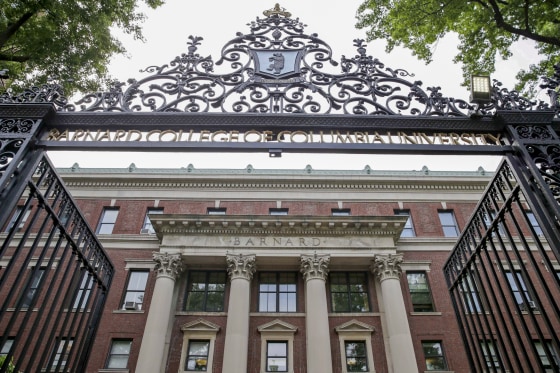A Pro-Palestinian protest unfolded Wednesday at Barnard College in New York City, where a small group “forcibly entered” a campus hall and are alleged to have physically assaulted a school employee, college officials said.
A sit-in demonstration was organized Wednesday at Barnard's Office of the Deans to protest the expulsion of two Barnard students last week over allegations of “disrupting” a Columbia University class on Israeli history a month earlier, according to the protest group Columbia University Apartheid Divest. Barnard College is an independent women’s college affiliated with Columbia in which students can take courses at both schools.
During the protest, a small group of masked demonstrators “forcibly entered Milbank Hall” and “physically assaulted a Barnard employee, sending them to the hospital,” Robin Levine, Barnard’s vice president for strategic communications, said in a statement Wednesday evening.
New York police said they responded to the vicinity of West 120 Street and Broadway around 4 p.m. Wednesday and found a 41-year-old man who said he was “shoved by numerous individuals and complained of pain about the body.” He was taken to Mount Sinai Morningside Hospital, where he was stable. Police said no one was arrested.
“They encouraged others to enter campus without identification, showing blatant disregard for the safety of our community,” Levine said. “Violence and intimidation have no place here.”
The group Columbia Students for Justice in Palestine had posted on X: “We do not need outside support for the sit-in.” Instead, anyone who wanted to support was asked to head to a rally in Bay Ridge.
Levine said protesters had until 9:30 p.m. to leave the building or else the college would "be forced to consider additional, necessary measures to protect our campus.”
Barnard President Laura Rosenbury said in a statement later Wednesday night that the protesters had vacated Milbank Hall.
“Tonight, a small group of masked protesters attempted to undermine Barnard’s core values of respect, inclusion, and academic excellence," Rosenbury said. “Thanks to the efforts of our staff and faculty, the protesters have now left Milbank Hall without further incident. But let us be clear: their disregard for the safety of our community remains completely unacceptable.”
The student group Columbia Students for Justice in Palestine shared videos of the protest's progress on X.
One video showed participants wearing keffiyehs, traditional Arab headdresses and symbols of Palestinian nationalism, and masks covering their mouths chanting and clapping to the beat of a drum as they sat in the hall of a building. Another video shared at 5 p.m. Wednesday showed a protest organizer updating participants on conversations with school leaders.
The Columbia Spectator, the student newspaper, reported that the group gathered outside Barnard Dean Leslie Grinage’s office in Milbank Hall, where they remained for over six hours.
The protest disrupted classes in Milbank, according to the paper. Barnard told faculty members with classes there after 5 p.m. Wednesday to either relocate or cancel.
Later in the evening, the student protest group posted on X that Barnard protesters had dispersed “after successfully forcing administrators to the negotiating table” in a meeting set for 1 p.m. Thursday.
Nearly 100 students from Barnard and Columbia participated in the initial sit-in protest at the Office of the Deans, Columbia University Apartheid Divest said in a news release.
They were demanding reversal of last week's two expulsions, amnesty for students disciplined for pro-Palestinian views and a public meeting with Grinage and Rosenbury.
The group said Barnard had already suspended over 50 students for pro-Palestinian protests. The expulsions last Friday were the first at either Columbia or Barnard for pro-Palestinian protests and the first expulsions for protests on the campus since 1968.
Last year, Columbia University was the site of tense student-led protests decrying the Israel-Gaza war and demanding the university divest from companies that support Israel. Tent encampments were erected on the campus quad and demonstrators took over campus buildings in protests that led the school to call New York police.
